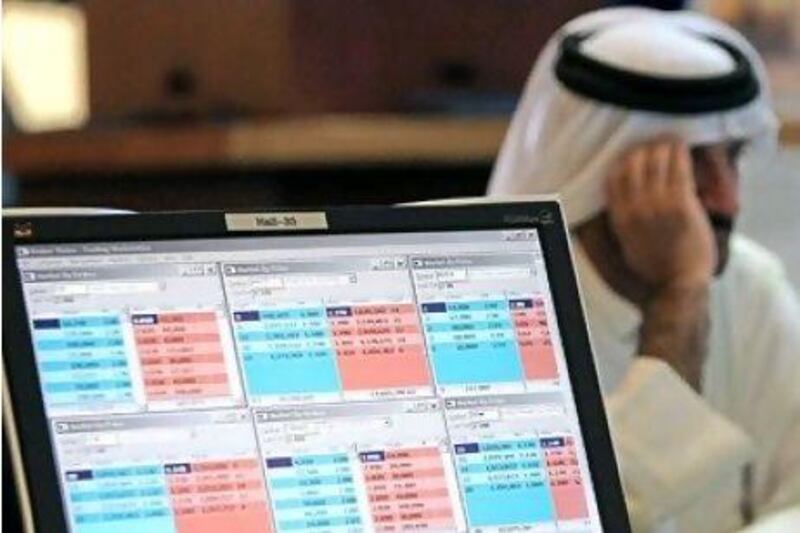It was the Gulf's turn to take a hit yesterday as markets sank across the region in the aftermath of a historic credit downgrading in the US and amid widespread concern over the outlook of the global economic recovery.
Financial Fallout: More on the global economic chaos
Finance chiefs hold crisis talks Global finance officials used emergency meetings to seek to stem the fallout from the debt crises brewing in both the US and Europe. Read article
UAE likely to stick with dollar peg Regional pegs to the US dollar may come under the spotlight after the downgrade of the US credit rating by Standard & Poor's. read article
US downgrade threat to Gulf borrowing costs Banks in the Gulf may find themselves in a tough position following the downgrade of the US's credit rating by Standard and Poor's, analysts say. read article
Global gloom takes its toll on UAE stock markets Markets slumped in the Emirates amid a broad selloff of company stocks. Read article
Major indexes in the UAE and Qatar suffered the biggest declines in stock values, while those in Bahrain, Kuwait and Oman also fell.
In Abu Dhabi, where investors did not retreat as much, stocks listed on the Abu Dhabi Securities Exchange General Index slid 2.5 per cent and ended the day at 2,603.22.
Shares declined more than 3.6 per cent on the Dubai Financial Market General Index, its largest drop in more than five months. It closed at 1,484.31 and is now down 12 per cent from this year's high in April.
The Bahrain Bourse All Share Index slipped 0.3 per cent, while Kuwait's gauge dropped 1.6 per cent. In Oman, the MSM 30 Index fell 1.9 per cent. In Qatar the QE index fell 2.5 per cent.
The declines in both the local and regional stock markets are "due to uncertainty on [the global] economic outlook", said Marwan Shurrab, the chief trader at Gulfmena Investments, an asset management company based in Dubai. "The potential [for] slowdown in the recovery from the recession is high, which is one of the reasons we're seeing high volatility and sell-offs on markets," he added.
Many investors in the region also remain cautious given the Gulf's strong ties to the US economy.
The dirham, as well as four other currencies in the Gulf, is pegged to the greenback. A high amount of the region's oil wealth is also weighted in US dollars.
"If the US dollar starts to lose ground against major currencies, it'll affect growth in the region - and oil prices as well, which is the main source of revenue here," Mr Shurrab warned.
Both indexes in the Emirates were down further in intraday trading yesterday, pressured largely by the uncertainty in Saudi Arabia's stock market when it first opened.
Investors in Saudi Arabia saw the country's Tadawul All-Share Index shed nearly 5.5 per cent of its value on Saturday, or about US$7.5 billion (Dh27.54bn), following news Standard & Poor's ratings agency had cut the US's coveted "AAA" status for the first time in the country's history.If turmoil does spread to financial markets around the world, it could raise borrowing costs for the US government.
Trading did start to recover on the kingdom's stock market by midday yesterday, and its index ended the day 0.8 per cent higher.
Investors looking ahead to the opening of trading markets in other parts of the world today are now bracing for more volatility, experts say.
One issue compounding matters is that trading has been relatively light this month, as many investors tend to go on vacation. Since it is also the month of Ramadan this year trading is even quieter than usual in the region.
"Trading volumes are at their lightest pretty much everywhere in the world," said Jahangir Aka, the senior executive officer of SEI Middle East, an investment management firm based in Dubai. "Reactions are being made on some pretty thin volumes relative to things that probably would not create such an impact in normal times."
Financial experts say the markets could improve if more positive economic data quickly comes out from the US or Europe, where many countries are weighed down by debt.
Last week, for instance, figures showing a growth in new jobs opening up in the US gave signs of improvement in at least one key area. "From an economics perspective, this is why we're being very cautious here," said Mr Aka. "This isn't the time to panic."






